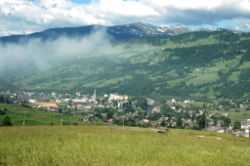Yasinia
From Wikipedia, the free encyclopedia
| Yasinia Ясіня | ||
|---|---|---|
| Urban-type settlement | ||
 | ||
| ||
 Yasinia | ||
| Coordinates: 48°16′22″N 24°22′29″E / 48.27278°N 24.37472°ECoordinates: 48°16′22″N 24°22′29″E / 48.27278°N 24.37472°E | ||
| Country | Ukraine | |
| Oblast | Zakarpattia | |
| Raion | Rakhiv | |
| Named for | ash tree | |
| Elevation | 931 m (3,054 ft) | |
| Population (2001) | ||
| • Total | 8,000 | |
Yasinia (Ukrainian: Ясіня, Hungarian: Körösmezö) is an urban-type settlement in the Rakhiv Raion of the Zakarpattia Oblast in Ukraine.
It was the site of the Hutsul Republic after World War I, and the birthplace of several prominent Ukrainians declaring independence from Kingdom of Hungary. This republic was ended by Romanian troops on June 11, 1919. Yasinia was shortly reoccupied by Hungary in July 1919 and passed to Czechoslovakia according to Treaty of Trianon. Hungary again occupied it like whole Zakarpattia between 1939-1944. It was given to the Soviet Union in 1945.
The wooden church in Yasinia appears on several stamps of the area, including the first stamp of Carpatho-Ukraine.[1][2]
People from Yasinia
- Daniel Ivancho
- Stepan Klochurak
- Ferenc Felkai
See also
- Kobyletska Poliana and Velykyi Bychkiv, the other two urban-type settlements in Rakhiv Raion of Zakarpattia Oblast
References
- ↑ Kuzych, Ingert. "Focus on Pilately". Retrieved 2009-06-24.
- ↑ Kuzych, Ingert (July/August 1991). "In Search of the Church at Yasinia (Jasina)". The Czechoslovak Specialist 53 (4): 4. ISSN 0526-5843. Retrieved 2009-06-24.
| |||||||||||||||||||||||
This article is issued from Wikipedia. The text is available under the Creative Commons Attribution/Share Alike; additional terms may apply for the media files.
